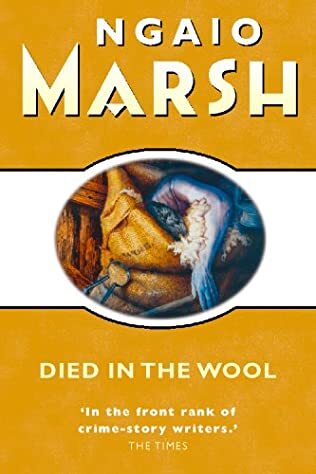Died In The Wool

A review of Died in the Wool by Ngaio Marsh
This was a Roderick Alleyn murder mystery story, the thirteenth in the series and originally published in 1944, which left me a tad underwhelmed. It was a well-constructed, well-written tale but it seemed a little one-paced for my taste. Although set in Marsh’s home country of New Zealand, as was her previous novel, Colour Scheme, apart from the sheep, it lacked any local colour. Marsh also seemed conflicted as to whether it was a traditional murder mystery or a thriller and, in the end, it became a bit of both, never a recipe for success.
It is also a little unusual in that by the time Roderick Alleyn visits Mount Moon, the Rubrick’s remote sheep farm, Flossie, the wife and Member of Parliament, had been murdered fifteen months earlier and Archie, has died, of natural causes a year ago. It is the coldest of cold cases and much of Alleyn’s investigation is conducted by way of a family convention at which those living at the farm give him their recollections of the evening in question. It provides Alleyn an opportunity to make a character study of each of the key suspects and to understand the motivations for the murder. Most people in the room have reason enough to have killed her.
Terence Lynne’s amorous attachment to Archie had been discovered by Flossie shortly before her death and she cold-shouldered Terry and was overly amorous to Archie. Flossie had been cold to her nephew, Douglas Grace, who had been invalided with an injury to the gluteus maximus, since he raised his suspicions about espionage in the farm. Fabian Losse, invalided with a head injury which resulted in periods of mental instability, was sweet on Flossie’s ward, but he received no encouragement. Cliff Johns, son of the farm manager, who, because of his musical talent was taken under Flossie’s wing, had a falling out with her when Cliff was accused of stealing whisky. Markins, the manservant, also acts suspiciously although the reason for that soon becomes apparent.
Alleyn’s purpose for visiting Mount Moon is not principally to investigate the murder. He is still in New Zealand on a top-secret mission to root out fifth columnists and he is there because of a tip off that a secret project, upon which Grace and Losse, are working on at the farm, has been compromised. Of course, the murder and the security breach are intertwined but Marsh’s focus jumps between one and the other without settling upon which should be the story’s main focus.
As befits a Marsh novel, the death is ingenious. Flossie is killed in the shearing barn by a sharp blow to the head and then her body is placed in the baling machine for it to be wrapped firmly and securely in a bale of the Rubrick’s finest wool. It allows her to justify the rather weak pun that serves as the book’s title.
Flossie’s fate is nearly suffered by Alleyn, but the victim of the second assault, Fabian, made the mistake of wearing Alleyn’s overcoat. Mistaken identity, alibis dependent upon music, some marks on the floor, a stub of a candle, a lost diamond clip are what lead Alleyn to his conclusion and to prove his suspicions he sets a trap, with himself as bait, into which the culprit falls. In truth, there are only two, three at a pinch, credible suspects and the antecedents of one is enough to give the game away, but Alleyn is nothing if not thorough.
As a book it had its moments but was not one of Marsh’s best.



